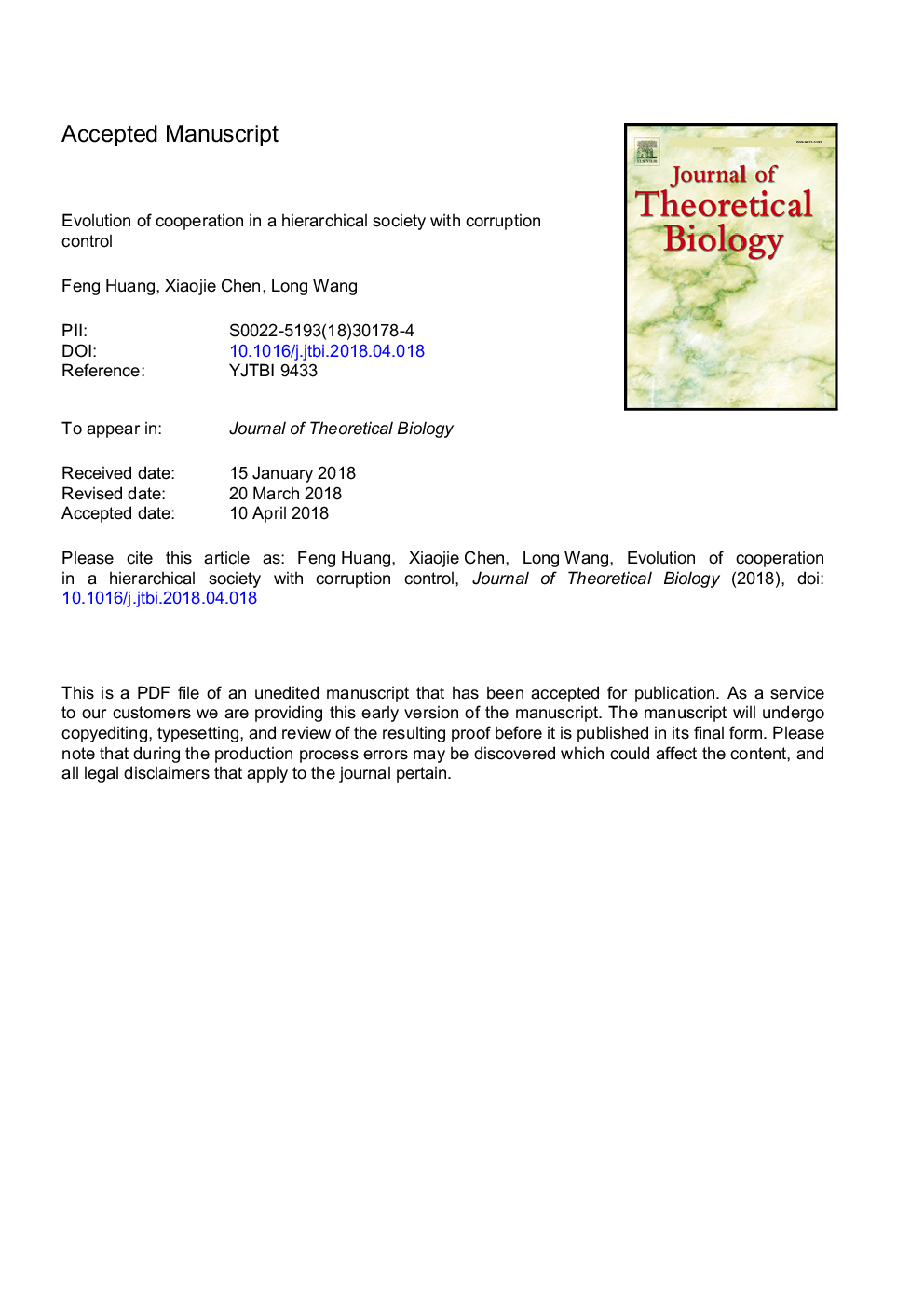| کد مقاله | کد نشریه | سال انتشار | مقاله انگلیسی | نسخه تمام متن |
|---|---|---|---|---|
| 8876667 | 1623761 | 2018 | 42 صفحه PDF | دانلود رایگان |
عنوان انگلیسی مقاله ISI
Evolution of cooperation in a hierarchical society with corruption control
ترجمه فارسی عنوان
تکامل همکاری در یک جامعه سلسله مراتبی با کنترل
دانلود مقاله + سفارش ترجمه
دانلود مقاله ISI انگلیسی
رایگان برای ایرانیان
کلمات کلیدی
تئوری بازی تکامل مجازات فاسد، بازی های عمومی کالا، دینامیک تکثیر کننده،
ترجمه چکیده
مجازات به عنوان یک پیشگام بالقوه در حفظ و یا حتی تقویت همکاری های عمومی شناخته شده است، اما در عین حال، مشکل سوء استفاده کنندگان از مرتبه دوم را ایجاد می کند. به ویژه شواهد اخیر نشان می دهد که اگر مجرمان ممکن است در فساد دخالت کنند، مجازات های گران قیمت می توانند حفظ شوند. با این حال، چگونگی کاهش یا از بین بردن حوادث فساد اداری در جامعه انسانی پابرجاست. به عنوان عدم تقارن قدرت با سلسله مراتب ها مرتبط است، ما بررسی می کنیم که مجازات های گران قیمت بر تکامل همکاری در موارد بدون کنترل و کنترل فساد تاثیر می گذارد. در صورت عدم کنترل فساد، مجرمین آلتوسین قادر به مجازات مجرمان فاسد نیستند. مجازات فاسد، همکاری غیرنظامی را حفظ می کند، اما تضعیف تناقضات خصمانه را تضعیف می کند. در غیر این صورت، مجرمین آلتوسین می توانند مجازات های متقارن یا نامتقارن را در هر دو مجازات فاسد و متخلفان غیرنظامی اجرا کنند. در این مورد، همکاری های غیرنظامی و مجازات های آلتروریستی می تواند ارتقا یابد. و به عنوان ابزار کنترل فساد، سیاست مجازات نامتقارن در تقویت مشارکت عمومی و بهبود رفاه اجتماعی نسبت به مجازات متقابل موثرتر است. علاوه بر این، مهم نیست که آیا کنترل فساد در نظر گرفته می شود یا خیر، فساد ظالمانه ای که مجرمان غیر تعاونی مجازات می کنند، متضرر می شوند، یک فرم موثرتر برای افزایش همکاری در مقایسه با رشوه دادن است. بنابراین کار ما ممکن است بینش مربوط به اثرات فساد در همکاری های دولتی و سیاست ضد فساد را ارائه دهد.
موضوعات مرتبط
علوم زیستی و بیوفناوری
علوم کشاورزی و بیولوژیک
علوم کشاورزی و بیولوژیک (عمومی)
چکیده انگلیسی
Punishment is widely recognized as a potential promoter in sustaining or even enhancing public cooperation, but it meanwhile induces the problem of second-order free-riders. Particularly, recent evidence shows that costly punishment can be maintained if punishers may engage in corruption. However, how to reduce or eliminate incidents of corruption has been the enduring conundrum in human society. As power asymmetries are associated with hierarchies, we investigate how costly punishment affects the evolution of cooperation in the cases without and with corruption control. In the absence of corruption control, altruistic punishers are incapable of punishing corrupt punishers. Corrupt punishment maintains civilian cooperation but undermines the evolution of altruistic punishment. Otherwise, altruistic punishers can enforce symmetrical or asymmetrical punishment on both corrupt punishers and civilian defectors. In this case, both civilian cooperation and altruistic punishment can be promoted. And as an instrument of corruption control, the policy of asymmetrical punishment is more effective in fostering public cooperation and improving social welfare than symmetrical punishment. Moreover, no matter whether corruption control is considered or not, spiteful corruption that non-cooperative punishers penalize defectors is a more effective form for enhancing cooperation compared with bribery. Our work may thus offer an insight into the effects of corruption on public cooperation and the policy of anti-corruption.
ناشر
Database: Elsevier - ScienceDirect (ساینس دایرکت)
Journal: Journal of Theoretical Biology - Volume 449, 14 July 2018, Pages 60-72
Journal: Journal of Theoretical Biology - Volume 449, 14 July 2018, Pages 60-72
نویسندگان
Feng Huang, Xiaojie Chen, Long Wang,
